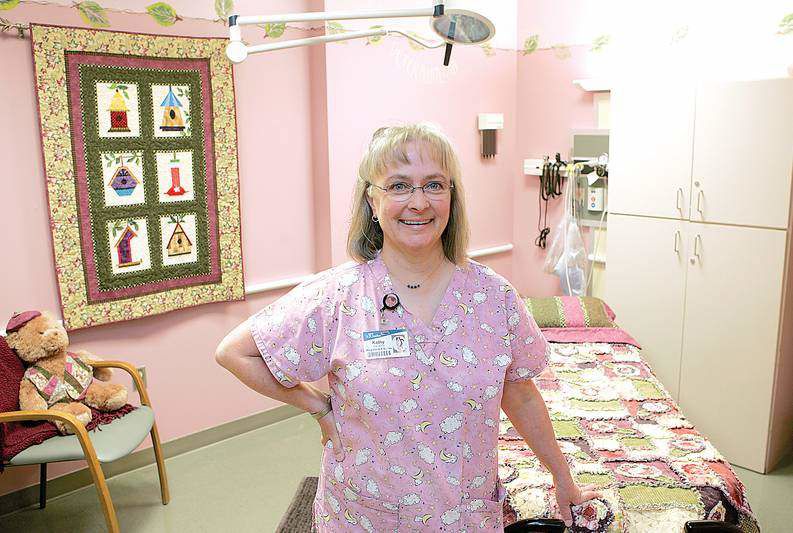Easing trauma of sexual assault
Published 4:00 am Friday, December 28, 2007

- Kathy Wade, RN, a certified sexual assault nurse examiner, stands in the room at St. Charles Bend that she repainted and redecorated for sexual assault victims.
Tucked in the corner of the emergency wing at St. Charles Bend is a room unlike any other.
The walls are painted a pale shade between pink and purple, and a border of light-yellow words, interspersed with leaves, encircles the room. Perhaps the most telling word is “no.”
The redecorated examination room, the work of Kathy Wade, RN, is one of the steps St. Charles Bend is taking to enhance care for victims of sexual assault. Both hospitals are expanding the number of nurses qualified to examine victims of sexual assault and collect evidence, particularly DNA, used to prosecute perpetrators.
Susan Yokoyama, a registered nurse and certified sexual assault nurse examiner — often referred to as SANE — said the hospital in Bend is seeing more victims each year.
“We’re getting close to 70 cases this year,” she said. “Last year it was 60-something, and the year before was 50-something.”
In addition, the Redmond hospital has seen 19 cases since a nurse examiner was placed there in May, Yokoyama said.
Because sexual assault is widely underreported, she said, it’s hard to say if more women are being victimized as Central Oregon’s population swells or if more victims are reporting the crime.
Kelly Schukart of Saving Grace, formerly the Central Oregon Battering and Rape Alliance, said her organization is seeing a similar increase.
Saving Grace runs a 24-hour hot line for victims of domestic violence and sexual assault, and an emergency shelter for women and children escaping violent environments. The agency also provides advocates for victims at St. Charles in Bend and Redmond and runs support groups.
“We are the only domestic violence (and) sexual assault program in Central Oregon,” Schukart said.
In 2006, the last year with numbers available, Saving Grace served 180 survivors of sexual assault, she said. In 2005, the agency reached 121 victims, and in 2004, it served 11 survivors.
But she, too, cautioned against making too much of the numbers, other than to remember they don’t show the complete picture.
“We will never know what percentage of people don’t report,” Schukart said.
In any case, the increase has prompted St. Charles in Bend and Redmond to begin training additional nurses to perform examinations for victims of sexual assault.
Yokoyama said that she believes St. Charles Bend could have a total of seven nurses certified to perform exams by the end of 2008, up from the current three examiners. St. Charles Redmond has two nurses training for certification, to assist the single current nurse examiner.
All nurses being trained are current employees of the hospitals. The training, however, will help ensure that someone qualified to perform an examination is available at all times.
The trauma that is specific to sexual assault victims also prompted the overhaul of a single room in the emergency wing of St. Charles Bend.
“The more cases I processed, the more I thought (the examination room) could be warmer and more inviting, and start the process of surviving sexual assault,” said Wade, a registered nurse and certified sexual assault nurse examiner.
The exam is extensive, involving a 14-page questionnaire and a head-to-toe examination of the victim’s injuries, Wade said. DNA swabs and photographs are taken. The clothes worn during the attack may also be collected as evidence.
The survivor may also be treated for sexually transmitted diseases and for potential pregnancy. The entire exam takes three to four hours.
After she got permission to redo the room, Wade said she went to the Mt. Bachelor Quilt Guild to ask if they were interested in helping.
The guild created one quilt that now hangs on the wall and another that covers the bed.
Wade repainted the room herself, stenciling 26 words — one for each letter of the alphabet — on the walls that reinforced the message of recovery.
Schukart said the room may help reduce the secondary trauma that victims sometimes feel during an examination.
Wade said that the response she will always remember came from a patient.
“The second or third person that came in (this room) — she was really upset,” Wade said. “After we were done, she asked if she could stay a couple moments and write down all the words in this room. I thought, ‘I won’t need one more compliment on this room.’”
To get help
• If you are a victim of sexual assault or domestic violence, call Saving Grace’s 24-hour hot line at 389-7021 or 866-504-8992.
• For more information or to volunteer, go to www.saving- grace.org or call 382-9227.






